- Home
- Don DeLillo
The Names Page 11
The Names Read online
Page 11
Athens took on the soft glow of an executive refuge, an old storytelling kingdom where men from many lands gathered to weave their tales of gunfire and chanting mobs. We who lived there began to feel we hadn’t fully appreciated the place. Stability was rare, it seemed, in the cities of the eastern Med, the Gulf, well beyond. Here was our own model of democratic calm.
They would come on scheduled flights out of Beirut, Tripoli, Baghdad, out of Islamabad and Karachi, out of Bahrain, Muscat, Kuwait and Dubai, the wives and children of businessmen and diplomats, causing room shortages in Athens hotels, adding stories, new stories all the time. This would happen in the first month of the new Islamic year. The men staying behind were encouraged by their embassies to take vacations, at the very least to stay indoors whenever possible. The first month was the holy month.
From the window I watched a priest come down a sidestreet toward the building. They moved like ships, these men in their black cassocks and cylindrical hats, wide and rocking. Sunday.
“Why aren’t you flying your plane?”
“Should I be?”
“Ever since I’ve been here you’ve gone out on Sundays.”
“Ann thinks I’m trying to develop a sense of ruined dignity. It would be impaired, this sense, if I were to stand in a dusty field with a model plane buzzing about my head. There’s nothing ruined in such a scene. It’s merely pathetic. When older men do certain things alone, it means you must pity them. Things boys are thought to do. There’s something suspect in this whirling ship of mine. That’s the theory.”
“Not Ann’s theory.”
“It’s a theory. I haven’t finished shaving, my shirt is open. All ways to enlarge my ruined dignity, according to her.”
“Is she right?”
“They’re her books,” he said evenly.
“Business problems. Are you having trouble coming up with assignments?”
He waved a hand.
“Because I can always talk to Rowser.”
“Spare me.”
“He’s not so bad. Once you understand the way his mind works.”
“How does his mind work?”
“On-off, zero-one.”
“Binary. How do minds in general work? Anyone’s. Christ, we’re out of beer. Are there stores open seven days a week after death?”
The tribal mask was wood and horsehair, grimacing. Heavy lidded eyes, geometric nose. I almost told Charles about the murders in the Cyclades. But going over it mentally I found the subject so closely tied to Owen Brademas there was little to say without bringing him into it. A character study of Owen would be necessary. The material was his, the suggestion of a sense behind the killings. I didn’t think I was up to providing a back ground, on a sleepy late-summer day, and Charles appeared in no mood to take one in.
“I don’t mind working for Rowser at all,” I said. “I told Kathryn. This is where I want to be. History. It’s in the air. Events are linking all these countries. What do we talk about over dinner, all of us? Politics basically. That’s what it comes down to. Money and politics. And that’s my job. Yours too.”
“I’m in the world, granted. I’ve always been in the world. But I don’t know that I like it anymore.”
“All of us. We’re important suddenly. Isn’t it something you feel? We’re right in the middle. We’re the handlers of huge sums of delicate money. Recyclers of petrodollars. Builders of refineries. Analysts of risk. You say you’re in the world. That’s profound, Charles. I wouldn’t have reacted to that a year ago. I would have nodded absent-mindedly. It means something to me now. I came here to be close to my family and I’m finding something more. Seeing them. But also just being here. The world is here. Don’t you feel that? In some of these places, things have enormous power. They have impact, they’re mysterious. Events have weight. It’s all gathering. I told Kathryn. Men running in the streets. People. I don’t mean I want to see it blow up. It’s a heightening, that’s all. When the Mainland Bank makes a proposal to one of these countries, when David flies to Zurich to meet with the Turkish finance minister, he gets a feeling, he turns a little pinker than he already is, his breath comes faster. Action, risk. It’s not a loan to some developer in Arizona. It’s much broader, it has a serious frame. Everything here is serious. And we’re in the middle.”
“How do minds work?” he said.
“What?”
“What does the latest research show?”
“I don’t know what you’re talking about.”
“It’s in the air. It’s history. It’s turning pinker all the time.”
His voice had the abruptness of someone who talks to strangers in the subway. It was naked. There was an element of injured self in it. Whatever the tone indicated, I didn’t think there was any point in responding.
I went out to the terrace. It was one of those sandblasted days. The city was achromatic, very dense and still. A woman came out of a building and walked slowly down the street. She was the only person in sight, the one thing moving. In the emptiness and glare there was a mystery about her. Tall, a dark dress, a shoulder bag. Locusts droning. The brightness, the slow afternoon. I stood watching. She stepped off the curbstone without looking back this way. No cars, no sound of cars. Was it the empty street that made her such an erotic figure, the heat and time of day? She drew things toward her. Her shadow gave a depth to things. She was walking in the street and even this was powerful and alluring, an act that had erotic force. The body presumes on the machine. An arrogance that’s sensual. That nothing else moved into view, that she walked with a lazy sway, that her dress was the kind of fabric that clings, that her buttocks were hard and tight, that the moment of her passage in the sun went by so slowly, all these things made sexual drama. They weighed on me. They put me in a near trance of longing. That’s what she was, hypnotic, walking down the middle of the street. Long slow empty quiet Sundays. When I was a boy these were the days I hated. Now I looked forward to them. Prolonged moments, dead calm. I needed this one day, I’d found, of simply being.
Ann was in the living room when I went back inside. Her face seemed bleached, eyes large and pale. She held a drink.
“Don’t look at me.”
“I thought you were out,” I said. “On the phone Charles said you were at the flower market.”
“It closes at two. I got here just before you did actually.”
“Been hiding from me.”
“I suppose I have.”
“Where is Charles?”
“Napping.”
“What an interesting couple. They take turns disappearing.”
“Sorry, James, really.”
“I ought to be going anyway.”
“Don’t be so glum. What are you drinking?”
“You’re having problems then.”
“That’s the nature of the beast, isn’t it? Our son is planning a visit. Peter. We’ll repair it by then. Our duty is clear. Did you notice, he didn’t finish shaving? He always seems on the verge of doing some great sort of comic turn. He lapses into comedy all the time. I wonder if he knows. The man’s actually a gifted comic. I mean half shaven. He won’t let me go with him to fly his plane. He doesn’t want to be seen.”
There was a ready-made quality about the way she spoke. Tired nonstop fluency. It came raining out. Tension and fatigue made her overbright, almost frantically eager to string sentences together, any sentences. She used pitch as an element of meaning. What she said was beside the point. It was the cadences that mattered, the rise and fall of the ironic voice, the modulations, the stresses. What we lacked was a subject.
“Have we spoken since Nairobi? I came back with some wonderful dirty words. My sister collects them for Charles. The life they lead, let me tell you. A house servant, a gardener, a man for the horses, a night guard, a day guard. But there’s no butter, there’s no milk.”
Her eyes wouldn’t meet mine.
“The Tennants are here, you know. We’ll all go to dinner this week. They don’t m
uch like it here. They want to go back to Tehran. They’re determined, regardless of danger.”
She’d met the Tennants in Beirut. Earlier they’d lived in New York. In four years there, the Tennants said, no one ever bothered them. No one was rude or abusive. They were never threatened or mugged. They walked everywhere, they said in a tone that pretended to wonder why such a thing should be considered remarkable. This is what people said when they wanted to pay formal tribute to New York.
We walked everywhere.
“I feel sad for them,” she said. “They were only just getting the feel. It takes more time in some places than others. I mean when people aren’t shooting, of course. When they’re shooting, you just go about your business, head down. You don’t have to worry about getting the feel or learning the rhythm. It’s all rather dramatically done for you. Where you can go, when you can go there.”
In Beirut she used to go all the way to the airport to mail a letter. Some days they’d put it in a box, some days they’d give it back to her. In the end this is what brought them out. It wasn’t the local hepatitis, the cholera to the north, even the steady gunfire. It was the arbitrary nature of things. Moods and whims. Nothing the same two days running. Stray events. Life shaped by men whose actions had the wanton force of some sudden turn in nature. Often the men themselves didn’t know how they would act from one moment to the next and this put her on constant edge. She couldn’t follow the thoughts behind the eyes. Checkpoints, men’s eyes. The women kept washing floors. It seemed to be what they did in difficult times. During the worst of the fighting they kept on washing floors. They washed floors long after the floors were clean. The uniform motions, the even streaks. Unvarying things, she saw, must have deeper value than we know.
“Don’t look at me,” she said again.
“You’re not so hard to look at, you know.”
“Stop. I’ll be a grandmother one of these days.”
“Is Peter married?”
“Hardly. He tends to be dithery in his relations with people. I wish I could learn that kind of indecisiveness myself. Forever plunging. That’s your Ann Maitland, dearie.”
“Should we talk, you and I?”
“I thought men talked to other men. You know, buy each other foaming mugs of stout, do a little back-slapping. Things look better in the morning sort of thing.”
“Charles isn’t talking.”
“No, he isn’t, is he? He’d much rather sleep.”
“Charlie’s baffled.”
“It’s just an affair,” she said. “I’ve had others.”
“I wonder what I say to that.”
“Nothing. We’ll repair it. We have in the past. It requires sequences that have to be completed, one after the other. Distinct stages of development. The funny thing is I haven’t learned the drill as well as he has. I do badly at it. I make things difficult for all concerned. Poor James. I’m sorry.”
The voice was her own now, reflective and balanced, connected to something. She leaned forward to touch my hand. The world is here, I thought.
At first I thought the concierge was ten or fifteen years older than I was. The small girl clinging to his leg I took to be a granddaughter. It was a while before I saw I would have to adjust the relative levels, bring his age down, mine up. Most Greek men at forty seem totally fixed, part of the settled earth, assigned by time and custom to a particular set of duties, a certain face, a walk, a way of saying and doing. I was still waiting to be surprised by life. I was always coming or going, he was there, out on the sidewalk or behind his desk in the dark lobby, doing his records, drinking coffee.
He didn’t know a word of English. My Greek was so tentative and insecure I began to wish I could avoid the man. But it wasn’t possible to get by him without a sentence or two passing between us. He might ask about Tap, remark on the weather. Understanding him, answering correctly, was like making my way through a dream. I used to squint into his face, trying to pick a word out of the surge and glut, something that might give me a clue to what the subject was.
Hot.
Hot.
Very hot.
If l came into the lobby with groceries in a clear plastic bag he’d look over from his slot behind the desk and name the items one by one. At times I found myself repeating what he said or even saying the words before he did, when I knew them. I would lift the bag slightly as I walked by, making it easier for him to see. Bread, milk, potatoes, butter. The concierge had this power over me. He had the advantage, the language, and what I felt most often, passing in or out of his presence, was a childlike fear and guilt.
Aside from a limited vocabulary I had severe shortcomings when it came to pronunciation. Place-names were a special problem. Whenever I got off the elevator with a suitcase, Niko would ask where I was going. Sometimes he did this with a small hand twisting gesture. A simple thing, destination, but often I had difficulty telling him. Either I’d forget the Greek word or I’d have trouble pronouncing it. I’d put the accent in the wrong place, mess up the x sound, the r that follows the t. The· word would come out flat and pale, a Minnesota city, and I’d head off to the airport feeling I’d been unable to satisfy some obscure requirement.
In time I began to lie. I would tell him I was going to a place that had a name I could easily pronounce. What a simple, even elegant device this seemed. Let the nature of the place-name determine the place. I felt childish, of course. This was part of his power over me. But the lies began to worry me after a while in a way that had nothing to do with childishness. There was something metaphysically disturbing about them. A grave misplacement. They were not simple but complex. What was I tampering with, the human faith in naming, the lifelong system of images in Niko’s brain? I was leaving behind in the person of the concierge an enormous discrepancy between my uttered journey and the actual movements I made in the external world, a four thousand-mile fiction, a deep lie. The lie was deeper in Greek than it would have been in English. I knew this without knowing why. Could reality be phonetic, a matter of gutturals and dentals? The smoky crowded places where we did business were not always as different to us as the names assigned to them. We needed the names to tell them apart, in a sense, and I was playing fast and loose with this curious truth. And when I returned, how foolish I felt as he asked me how things had gone in England, Italy or japan. Retribution. I might have been wishing an air crash on myself or an earthquake on an innocent city, the city whose name I had uttered.
I also lied when I went to Turkey. I could handle the word for Turkey, it was one of my better words, but I didn’t want Niko to know I went there. He looked political.
That night I thought of Ann, the cities she’d lived in, what kind of bargains she’d struck with her husband and lovers. I thought of her affairs, sentimentally, as preparations for the loss she knew was coming. It was her husband’s job that took her to a place, then took her away. Places, always places. Her memory was part of the consciousness of lost places, a darkness that ran deep in Athens. There were Cypriots here, Lebanese, Armenians, Alexandrians, the island Greeks, the northern Greeks, the old men and women of the epic separation, their children, grandchildren, the Greeks of Smyrna and Constantinople. Their true home was to the spacious east, the dream, the great idea. Everywhere the pressure of remembrance. The black memory of civil war, children starving. Through the mountains we see it in the lean faces of men in flyspeck villages, stubble on their jaws. They sit beneath the meter on the café wall. There’s a bleakness in their gazing, an unrest. How many dead in your village? Sisters, brothers. The women walk past with donkeys carrying bricks. There were times when I thought Athens was a denial of Greece, literally a paving over of this blood memory, the faces gazing out of stony landscapes. As the city grew it would consume the bitter history around it until nothing was left but gray streets, the six-story buildings with laundry flying from the rooftops. Then I realized the city itself was an invention of people from lost places, people forcibly resettled, fleeing war and massac
re and each other, hungry, needing jobs. They were exiled home, to Athens, which spread toward the sea and over the lesser hills out into the Attic plain, direction-seeking. A compass rose of memory.
5
People were always giving her shirts. Their own in most cases. She looked good in everything; everything fit. If a shirt was too loose, too big, the context would widen with the material and this became the point, this was the fit. The shirt would sag fetchingly, showing the girl, the sunny tomboy buried in hand-me down gear. She used to snatch things off hangers in Yonge Street basements, the kind of shapeless stuff men wore north. These were stores with hunting knives in faded scabbards in the window, huge khaki anoraks with fur-lined hoods, and she’d grab a pair of twelve-dollar corduroys that became immediately hers, setting off her litheness, the close-skinned physical sense she expressed even sprawled across an armchair, reading. Her body had efficient lines that took odd clothing best, the weathered, the shrunken, the dull. People were pleased to see her in their work shirts, old sweaters. She was not a friend who asked many favors or required of others a steadfastly sympathetic nature. They were flattered, really, when she took a shirt.
I stood watching from the deck. In the west the sun was banded, fading down a hazy slate horizon. We moved along the rocky coast and came booming in heavy gusts around the point. The village danced in light. As we approached there was a momentary lull, landward. Things seemed to pause to let the flesh tone seep in. Contours were defined, white walls massed around the bell-tower. Everything was clear and deep.
The ship passed into a silence. Protected now. Old men came out to catch the hawsers.
I saw her walk with Tap into the square. The shirt she wore was identifiable from a distance. Long, straight, tan, with brass studs and red-rimmed epaulets. She wore it outside her jeans. A carabiniere shirt. Long sleeves, sturdy fabric. The nights were getting cool.

 Great Jones Street (Contemporary American Fiction)
Great Jones Street (Contemporary American Fiction) Americana
Americana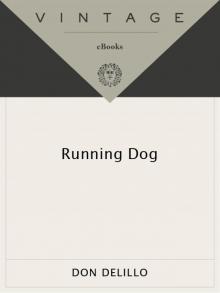 Running Dog
Running Dog Libra
Libra End Zone
End Zone Ratner's Star
Ratner's Star Underworld
Underworld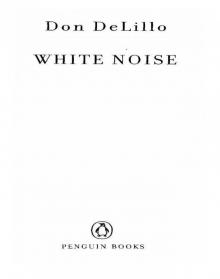 White Noise
White Noise Players
Players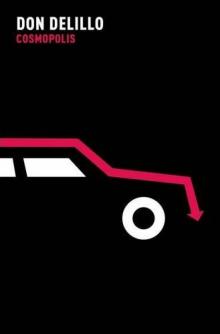 Cosmopolis
Cosmopolis The Silence
The Silence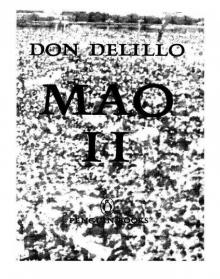 Mao II
Mao II Zero K
Zero K Great Jones Street
Great Jones Street The Angel Esmeralda
The Angel Esmeralda The Names
The Names The Body Artist
The Body Artist Point Omega
Point Omega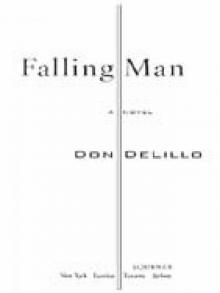 Falling Man
Falling Man